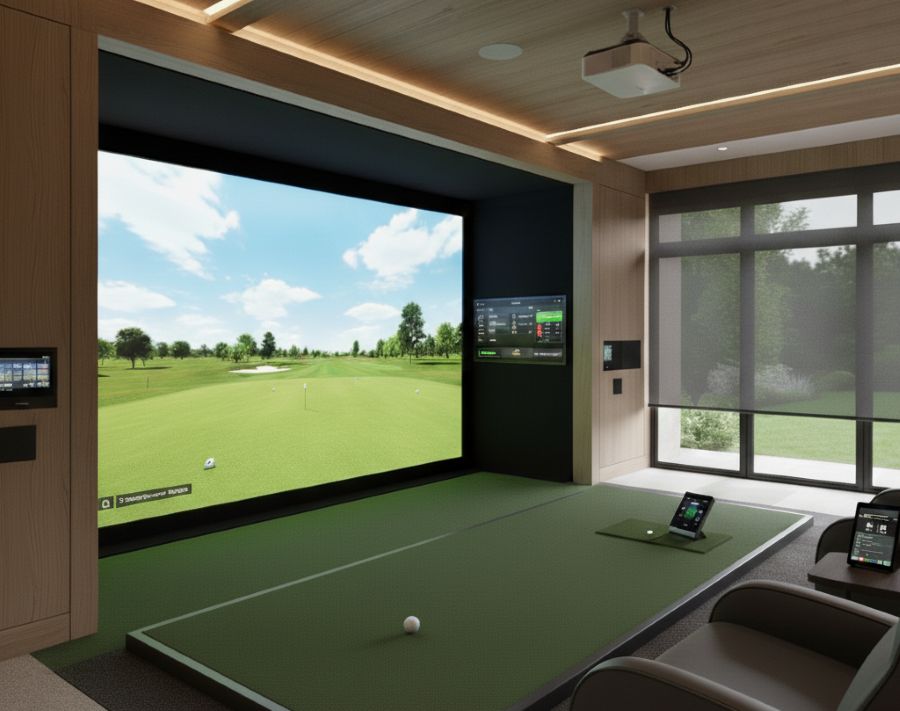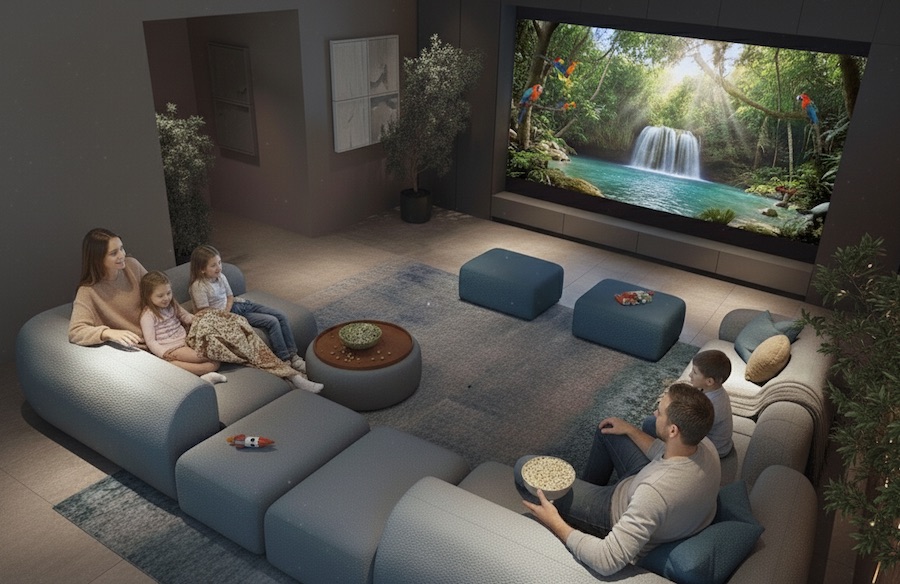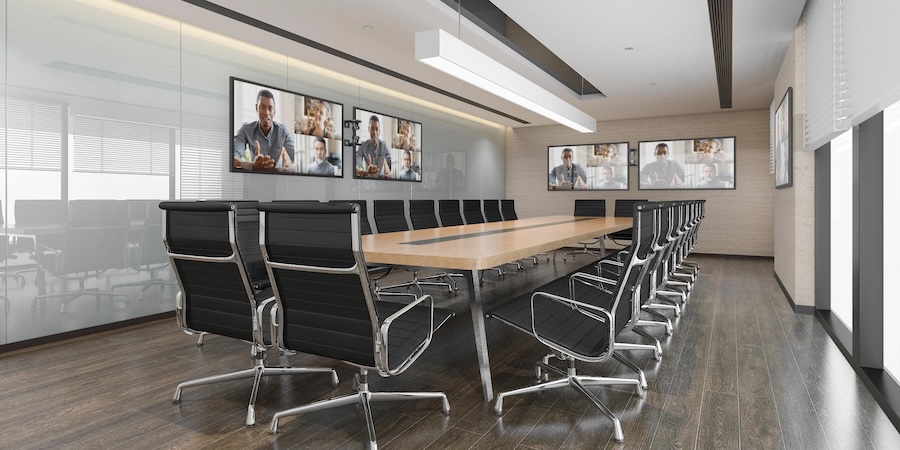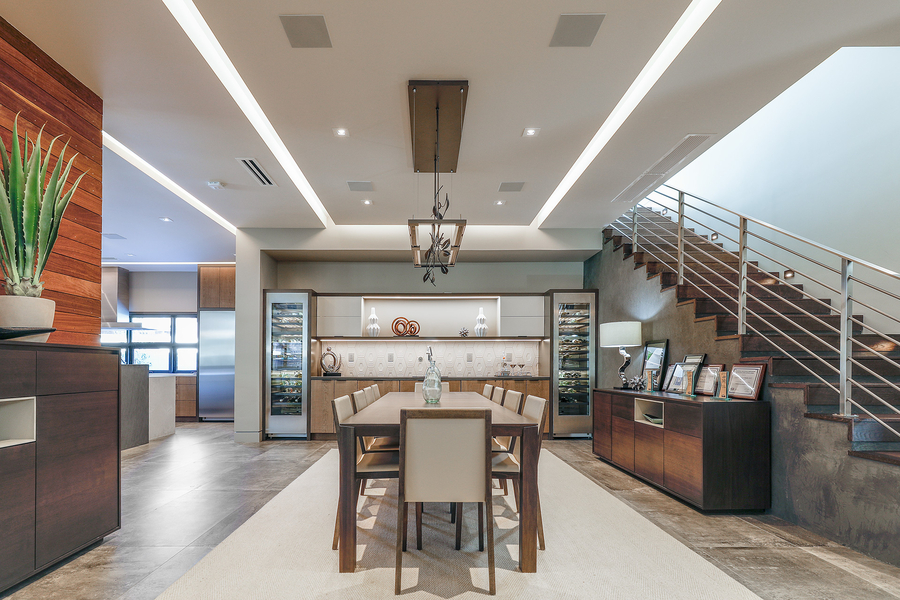Ultimate Guide to Projector Screens and Setups
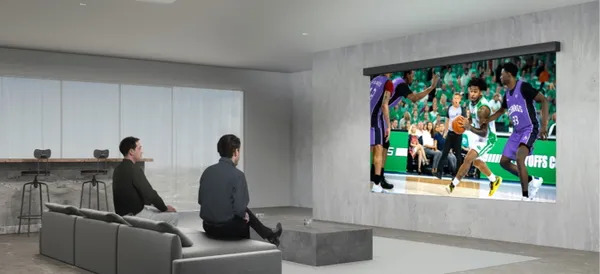
At a Glance:
Selecting the Right Projector Screen
Setting Up a Projector Screen: A Step-by-Step Guide
DIY Projector Screen Installation: Potential Risks and Benefits
Refined Systems: A Partner You Can Trust
Why Trust Residential Solutions?
Have you ever wondered how to transform your living room into a personal movie theater? The answer lies in one simple solution: the projector screen. This article will delve into the world of projector screens, explaining what they are and guiding you through the setup process.
Enjoy The Theater Experience at Home
Experience the movie theater in the comfort of your home with projectors and projector screens. Create a personalized theater room or install a projector in any room you choose.
Home Theater & Media Rooms
What is a Projector Screen?
A projector screen is a large surface where images or videos are projected, usually by a digital projector. It's an essential part of a home theater system, turning your wall into a cinematic experience. But setting it up isn't as simple as just hanging it on the wall. It involves carefully considering factors such as the size of the room, the projector's specifications, and the viewing distance.
Selecting the Right Projector Screen

Choosing the right projector screen is crucial for an optimal viewing experience. But how do you know which one is right for you?
Choosing the correct projector screen is not just about getting the biggest one you can find. It's about finding a screen that matches your projector's capabilities and fits well in your viewing space. A well-chosen projector screen can enhance the image quality, providing a more immersive and enjoyable viewing experience.
Learn more: 5 Reasons to Upgrade to a Multi Channel Home Theatre
Key Factors to Consider When Selecting a Projector Screen
Screen Size and Aspect Ratio
The size and aspect ratio of the projector screen are determined by the projector's resolution and the viewing distance. For instance, if you have a 1080p projector, a 16:9 aspect ratio would be ideal.
Gain and Viewing Angle
The gain is a measure of a screen's reflectivity, and the viewing angle is the angle at which you can view the screen without any significant loss in image quality. These two factors significantly impact the brightness and clarity of the projected image.
Material Quality and Compatibility with the Projector
The material of the projector screen should be compatible with the projector. Different materials have different properties that can affect image quality.
Matching your projector screen with your projector is crucial. One tip is to check the manufacturer's recommendations for screen size and gain based on the projector's specifications.
Projector Screen vs TV
Both projector screens and TVs have their own set of advantages and disadvantages. Let's explore them.
Advantages and Disadvantages of Projectors and TVs
Projector screens offer a larger viewing area and a more immersive experience than TVs. However, they require a darker room for optimal viewing. On the other hand, TVs are easier to set up and can be viewed in any light condition, but they are less portable and offer a smaller viewing area.
Factors to Consider When Deciding Between a Projector Screen and a TV
Screen Size and Immersive Experience
If you're looking for a truly immersive viewing experience, a projector screen indoors is the way to go. It can provide a much larger viewing area than a TV, making it perfect for watching movies or playing games.
Flexibility and Portability
Projector screens are more flexible and portable than TVs. They can be easily set up and taken down, making them perfect for temporary setups or outdoor movie nights.
Cost Considerations
While projector screens can be more affordable than large TVs, remember to consider the cost of the projector and the screen material.
Setting Up a Projector Screen: A Step-by-Step Guide
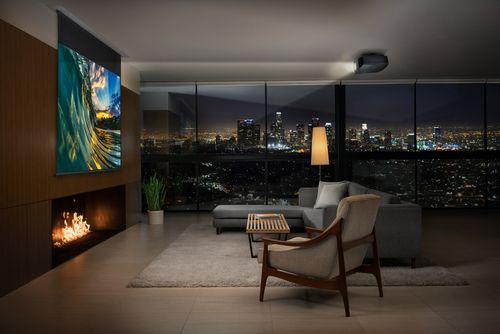
Pre-installation Preparations
Choosing the Right Location and Room Lighting
The first step is choosing the right location for your projector screen media room. This might seem simple, but it's more complex than you might think. It's not just about finding a blank wall; it's about finding a space that enhances your viewing experience.
The best location for your projector screen is in a room with minimal ambient light. Why, you ask? Well, too much light can wash out the image on the screen, making it less vivid and clear. However, if your room is well-lit, don't fret! You can always use blackout curtains or shades to control the lighting.
Moreover, the light source shouldn't directly hit the projector screen. Indirect lighting is preferred as it reduces glare on the screen. So, take some time to find the perfect spot - it's worth the effort.
Measuring the Desired Screen Size and Aspect Ratio
Now that you've found the perfect spot, it's time to decide on the size and aspect ratio of your projector screen. The size of your projector screen depends on the viewing distance and the number of viewers. Typically, the screen size should be approximately half of the viewing distance. So, if your couch is 10 feet away from the screen, a 5-foot wide screen would be ideal.
Next, let's talk about aspect ratio. The most common aspect ratios are 4:3 (standard) and 16:9 (widescreen). Your choice should align with the type of content you plan to view most often. If you're a movie buff, a 16:9 aspect ratio would be the best choice.
Components Needed for Installation
Motorized Projector Screen or Projector Screen Stand
Now that you've chosen the right location and size, it's time to choose the type of projector screen. If you're a fan of high-tech gadgets and convenience, a motorized projector screen might be your best bet. It can be rolled up or down at the push of a button, offering a sleek and modern look. Plus, it's excellent for rooms with high ceilings.
On the other hand, if you're looking for something more straightforward and portable, a projector screen stand could be the way to go. They are easy to set up and can be moved around effortlessly. So, consider your needs and preferences before making a choice.
Necessary Cables and Connectors
Your projector screen is useless without the right cables and connectors. You'll need an HDMI cable to connect the projector to your source device. Depending on your projector, you might also need VGA or DVI cables. And don't forget the power cable for your motorized projector screen or projector!
Mounting Hardware or Movie Screen
Whether you're installing a movie screen or mounting hardware for a motorized projector screen, you'll need some tools. A drill, level, and stud finder are essential. Some screens may come with their own mounting hardware, so check the box before you start.
Setting Up the Projector Screen
Mounting the Screen on the Wall or Ceiling
Mounting a projector screen may seem daunting, but it's all about precision. First, you'll need to mark the points where the screen will be attached. Use a level to ensure that these marks are straight. Once you've drilled the holes, you can mount the bracket and then attach the screen. Remember, safety first! Always make sure the screen is securely fastened to avoid any accidents.
Connecting the Projector to the Screen
Now that your screen is up, it's time to connect the projector. This step is relatively straightforward - simply connect one HDMI cable to the projector and the other to your source device. If your retractable projector screen is motorized, you'll also need to connect it to a power source.
Adjusting the Screen and Projector Settings for Optimum Display
Once everything is connected, you're almost ready to enjoy your favorite movie or show. But first, you'll need to adjust the screen for projector settings. Start by focusing the projector lens to get a sharp image. Then, adjust the brightness, contrast, and color settings to your liking. Don't be afraid to experiment until you find the perfect settings!
The Importance of Professional Installation
Setting up a projector screen can be a fun DIY project, but what if you aim for a more complex home theater setup? In such cases, professional installation might be the best option. Professionals have the technical expertise and experience to handle complicated setups efficiently. They can also provide valuable advice on the best equipment and placement for optimum viewing experience. So, why not let the pros handle the hard work while you sit back and enjoy the show?
Learn more: Home Theater Installation: What You Need to Know
DIY Projector Screen Installation: Potential Risks and Benefits
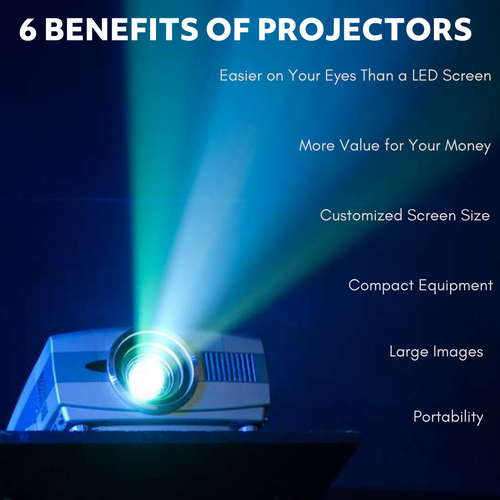
Advantages of DIY Installation
Cost Savings
One of the most significant benefits of DIY installation is cost savings. Professional installation services can be quite expensive, especially for complex setups. By doing it yourself, you can save a considerable amount of money. Plus, it can be a fun and rewarding experience!
Personalization and Customization Options
When you install your own projector screen, you have complete control over every aspect - from the choice of screen to its placement. This means personalizing your home theater to suit your preferences and needs. Want a bigger screen? No problem! Prefer a specific spot for the screen? You got it! The possibilities are endless.
Risks and Challenges Associated with DIY Installation
Potential Errors and Damage
Despite the benefits, DIY installation also comes with its own set of risks. One wrong move could lead to errors or even damage to your equipment. For instance, if the screen is not mounted properly, it could fall and get damaged. This is why it's crucial to follow the manufacturer's instructions carefully and use the right tools.
Lack of Technical Expertise
Not everyone is a tech whiz, and that's okay! But when it comes to installing a projector screen, some technical knowledge can be beneficial. Without it, you might face difficulties in setting up and adjusting the equipment for optimum viewing experience. So, if you feel unsure, don't hesitate to seek professional help.
Learn more: Paradigm Speaker Collections Compared
Refined Systems: A Partner You Can Trust
Refined Systems is a renowned expert in home theater installation. With years of experience and a team of highly skilled professionals, we provide top-notch installation services. Refined Systems has covered you whether you're aiming for a simple setup or a full-fledged home theater.
While DIY installation can be fun and rewarding, it's not always the best option. If you want a seamless viewing experience without any hiccups, professional assistance is the way to go. We can handle every aspect of the installation - from choosing the best projector screen to adjusting the settings for optimal display. Plus, it saves you the time and effort of doing it yourself. So why not let Refined Systems do what we do best while you sit back and enjoy your favorite movie or show on your new projector screen?
In conclusion, a projector screen is essential to a home theater system. It's crucial to select the right size, aspect ratio, gain, and material to achieve an optimal viewing experience. While TVs may be more convenient for everyday use, a projector screen offers a larger viewing area and greater immersion for special movie nights or gaming sessions. With this guide, you'll be on your way to transforming your living room into a personal movie theater in no time.
Imagine the possibilities of creating your own home theater with a projector screen. The cinematic experience it provides is truly unparalleled. Don't hesitate to contact experts like Refined Systems. We can provide advice and professional installation services to ensure you get the best viewing experience possible.
Projector Screen FAQs
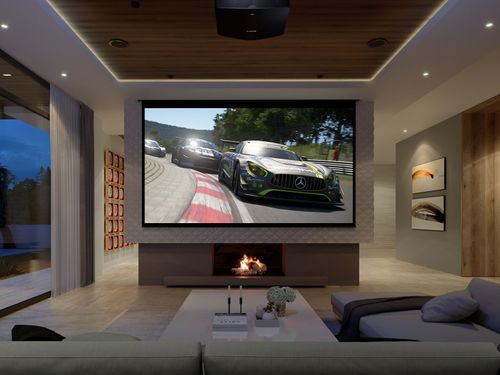
What type of projector screens are there?
There's a wide variety of projector screens available, each with unique advantages. Fixed frame screens are popular for home cinemas. Retractable screens, either motorized or manual pull-down, are great for spaces where you need to tuck them away when not in use. Tripod screens offer portability, and floor-rising screens provide an unobtrusive option when wall or ceiling mounting is not possible.
What is the best projector screen to buy?
The ideal projector screen depends on your specific needs. Setting up a home cinema? A fixed frame screen is a great choice. Need flexibility and portability? Consider a tripod or manual pull-down screen. For large spaces like auditoriums, electric screens are often suitable.
What kind of screen do you need for a projector?
The screen you need for a projector depends on factors like resolution, ambient light, viewing angle, and image quality preference. If the room has lots of light, a gray or black screen can enhance contrast levels.
How do I choose the right size for my projector screen?
Choosing the right size for your projector screen involves considering the size of your room and the viewing distance.
Can I use a wall instead of a screen for my projector?
While you technically can project onto a wall, it's not the best idea if you're after top-notch image quality.
Are retractable screens worth it?
Retractable screens offer convenience and flexibility as they can be tucked away when not in use.
What's the deal with inflatable projector screens?
Inflatable projector screens are a fantastic option for outdoor viewing experiences.
Can I use a projector without a screen?
You can, but keep in mind that a projector screen enhances the projected image's brightness, contrast, and color reproduction. Without it, the image quality may not be as good.
Do I need a special screen for a 3D projector?
For a 3D projector, a high-gain screen is often recommended.
What is a high-gain projector screen?
A high-gain projector screen reflects more light than a standard white screen, making the image appear brighter.
Why Trust Refined Systems?
Refined Systems is a leading technology integration company serving the Spring and Houston, Texas areas. For 13 years, our locally-owned business has established itself as a trusted provider of cutting-edge solutions for both residential homes and commercial businesses. With a portfolio of more than 1200 completed projects, Refined Systems has built a reputation for delivering exceptional quality and customer satisfaction.
Our services cover a wide range of needs, including home automation, media rooms, distributed home audio, window treatments, lighting control, and outdoor entertainment. For commercial customers, we specialize in providing advanced technology solutions that cater to a variety of businesses including corporate spaces, educational environments, as well as bars and restaurants. With a customer-centric approach, Refined Systems strives to exceed expectations, ensuring that their clients receive innovative and reliable technology solutions that enhance their daily lives and business operations.
Shop Projector Screens at Refined Systems
At Refined Systems, we only work with brands respected throughout the industry for their top-of-the-line products. Our professional team of technicians has the expertise to complete projects both big and small. If you’re interested in learning more about Projector Screens or have an idea for an upcoming project, make sure to call us or stop by our showroom today!
